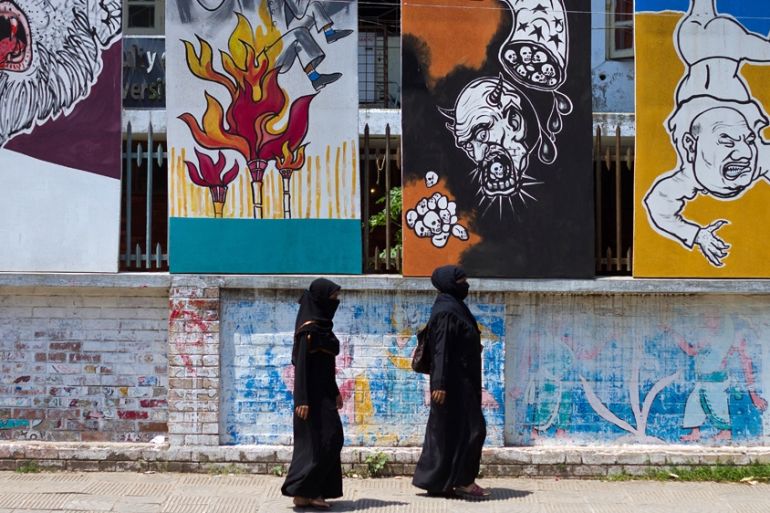Bangladeshi group orders firing of female journalists
Banned right-wing Ansarullah Bangla Team reportedly says it is against Islamic law for women to work in the media.

A banned right-wing group in Bangladesh has reportedly issued a threat to media companies asking them to sack female employees, claiming it is against Islamic law for women to work in the media.
In its latest threat letter, Ansarullah Bangla Team (ABT), which has claimed the killings of four bloggers earlier this year, “urged the media to release their women from their jobs”.
Keep reading
list of 4 itemsNPR editor resigns after accusing US outlet of liberal bias
Lawmakers brawl as Georgian Parliament considers ‘foreign agent’ bill
Journalist loses foot after being badly wounded in Israeli attack in Gaza
Dhaka Tribune newspaper reported on Thursday that the letter in the local Bengali language originated in southern port city of Chittagong, and was apparently sent by the publicity coordinator of the banned group.
The group, which last month issued a global hitlist of bloggers and writers, reiterated its death threat against 15 bloggers – nine of them living abroad – accusing them of participating in anti-Islam campaigns.
Naming the three bloggers – Niloy Neel, Washiqur Babu and Avijit Roy – all killed earlier this year, the group said those who follow these bloggers will meet a similar fate.
In an interview with Al Jazeera, a female journalist, working for the Dhaka Tribune newspaper, said there is a sense of fear among female journalists.
“It’s a concern for all the journalists. These kinds of threats cannot be ignored. It is a shock for all the women in the media sector,” she said, asking not to be identified.
Reporters Without Borders (RWB) has denounced the threat.
![The journalism watchdog group Reporters Without Borders (RWB) has denounced the threat of Ansarullah Bangla Team [Mahmud Hossain Opu/Al Jazeera]](/wp-content/uploads/2015/10/647a247648154c39898bc56635f5b18c_18.jpeg)
“We are already in contact with many of the bloggers who have been threatened. One of the common responses that we get from them is that they don’t trust the authorities,” said Benjamin Ismaïl, head of Asia-Pacific desk at the global watchdog for journalists.
“They don’t believe that authorities have the capacity and the will to help them,” he told Al Jazeera from Paris.
Police have told Al Jazeera that they were investigating the matter and treating it as a priority.
“We have received this kind of email before. Higher authorities have already been informed,” Deputy Commissioner of Police in Dhaka told Al Jazeera.
“Police are working to ensure the security of each and every citizens of this country,” Muntasirul Islam said.
Women in advertising
Bloggers, writers and activists who have written against religious fundamentalism have been targeted, with five of them being killed in the past one year.
Last month, the police made arrests in connection with the killing of Avijit Roy, a Bangladeshi-origin US national, who founded a secular blogging platform Mukto-Mona. He was hacked to death in front of the Dhaka University on February 26, an attack later claimed by Ansarullah group.
But in many cases the police have been crticised for heavy-handedness and lack of transparency in pursuing the case.
Doubts were raised over the arrest of Tawhidul Rahman, a UK man of Bangladeshi origin, and his alleged accomplices in August for the killing of bloggers.
Islam said that “some members of Ansarullah Bangla Team have been arrested before. “Now we are working on arrest the other members of group and bring them to book,” he said.
The letter also asked magazines not to use “beautiful female model in advertising”, adding that picture of women without veil cannot be printed in the newspaper”.
Bangladesh banned ABT in May this year after domestic and international pressure.
“In this particular message, they say it’s against Islamic law for women working in the media and the media showing them without the Islamic veil,” Reporters Without Borders’ Ismaïl said.
“They are putting pressure on the media to buy their interpretation of the Islamic law,” he told Al Jazeera.
Additional reporting by Mahmud Hossain in Dhaka